At 32, it's as if Sardinian Simone Tondo has already lived three times. In 2012 he opened Roseval in Paris Ménilmontant with his colleague Micheal Greenwold. An alternative menu with dishes in three steps (oignon-casserons-moelle, cochon-aubergine-pomelos…) made this ex-village right above the Bastille popular, attracting clients from all over the world. And got the title of “Best bistro in France” too, for Le Fooding. Quite a success at the time for the Italian cook.
But the young Sardinian felt he couldn't cook «Soups of smoked potatoes, caper leaves and scampi» for ever (his words). He felt he had to build something sounder and more ambitious. So in 2015 he left Roseval (now Dilia) and in September 2016 he took over La Gazzetta, the establishment – an emblem of Parisian bistronomie – where the momentous current that has made France and Europe understand that you no longer needed to spend 50 euro banknotes to eat fine food began. He gave the new restaurant his name: Tondo.
«We started working well», he recalls now, «but it was like riding a Ferrari barefoot. We were seating 80 people, too many with hindsight. The costs were very high, and the work was demanding because, by choice, we wanted to dedicate more time to transforming the ingredients and to presentation». Tondo had 33% of the shares. One year later, the majority of the partners fired the brigade in 5 days. «I now think we needed time to consolidate the clientele. But they decided not to wait».
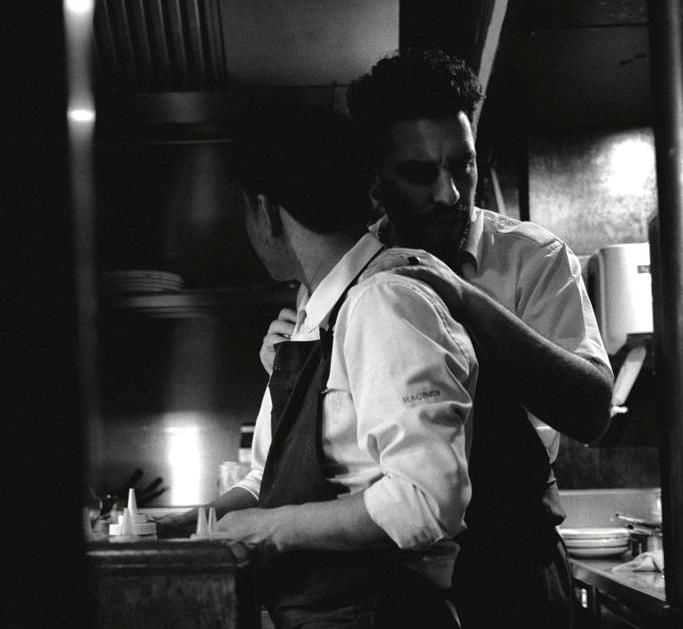
Simone Tondo (chef) and Biplop Deb (on the floor)
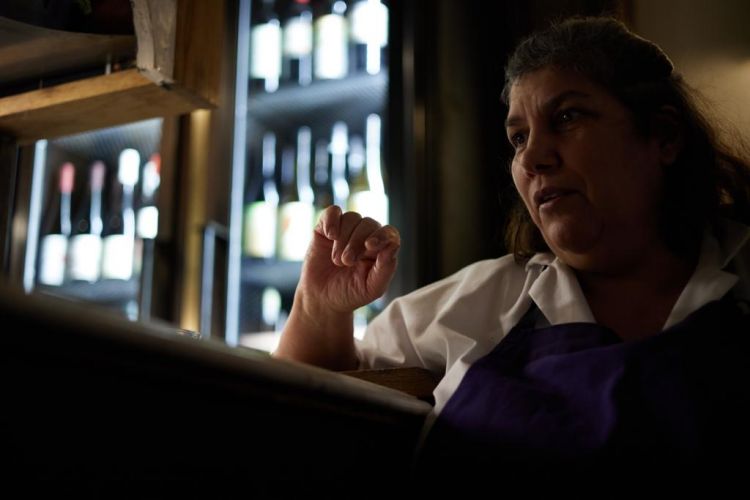
Marjo Covas, head pastry chef
This hard blow hurt the young man. Temporarily.
Alain Ducasse made him an offer he didn't accept. «The first thought was that I had to save my brigade, guide it elsewhere». In January 2018, with the new business partners, his partner
Stefania Melis («she's the real general manager») and British
Stephanie Crockford, already dining room manager at
Tondo, he took over at
Racines, one of the first
table à manger in town, a single window and two floors at Passage de Panoramas, the most romantic and ancient covered passage in town. Behind the glass door, a few tables: 26 guests, in front of a 5-square metre kitchen.
«I had an irrational fear of failing again», the cook recalls today, «so I tried to start from a different priority: building the team. We strongly suspected that we had neglected the importance of people, and we acknowledged that we were first of all entrepreneurs. What with dining room and kitchen we were three at first:
Steph, kitchen hand
Dulal, and I. I arrived as chef and business partner for 10%. Things went well from the start. One year later, we bought 100% of the shares».
There's more. In January 2019 Racines got a Michelin star. A surprising acknowledgement because the format of the cuisine is simpler than that at
Tondo: sirloin veal with tuna sauce, Milanese cutlet, with a light and crispy breading, pasta al dente with fresh fish... A trattoria style. And most of all, an Italian cuisine inspired by
Pierangelini, we could say, that is to say with excellent ingredients and the goal of transforming them just a little through sparkling ideas, not obsessive technique.
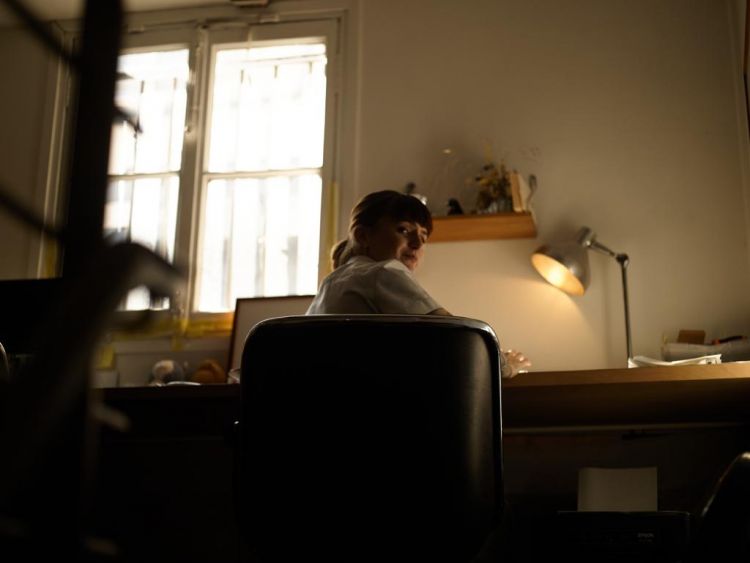
Stephanie Crockford, director
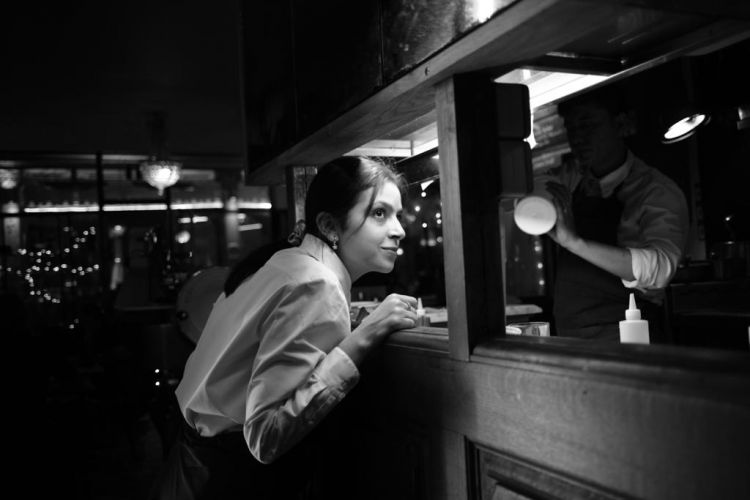
Hadhami Beji, waiting staff
Today Racines serves food praised by critics (like
François Simon on Le Monde), public (you need to book well before two weeks in advance for dinner). And famous colleagues: sometimes you can find people like
Thomas Keller,
Alain Ducasse,
Olivier Roellinger, dining at Simone's… These demonstrations of respect are worth more than a star (which mysteriously disappeared from the Red Guide the following year).
In these dramatic times of staff shortage – a global restaurant problem – one has the strong suspicion that a good part of the success is based on the virtuous handling of the staff: Racines is open 7 days a week, at lunchtime and in the evening but each one of the employees (15 now, five times as many as in the beginning) works for three days and a half per week, and rests for as many. Not counting the month and a half of holidays between August and December/January. It's like Tondo has built a double brigade, a model many aspire to, and surely more popular in France than in Italy: «You cannot start with this model from scratch», the cook says, «it's the natural goal of a constant economic growth».
Is the cost of salary perhaps lower in France than in Italy? «No, it counts more or less the same». If anything, what differs is personal attention and the possibility of growing: «How can employees be happily productive if they're not treated well? I try to behave with them the way I wish I had been treated 10 years ago. We have a team of boys and girls from Bangladesh, England, Portugal, Italy-Tunisia, Dominican Republic, Korea… And we pay for everyone's permit, and offer a dignified salary». How dignified? «The kitchen hand gets 1550 euro after taxes», which is around what a commis earns in a starred restaurant with one day and a half or rest per week.
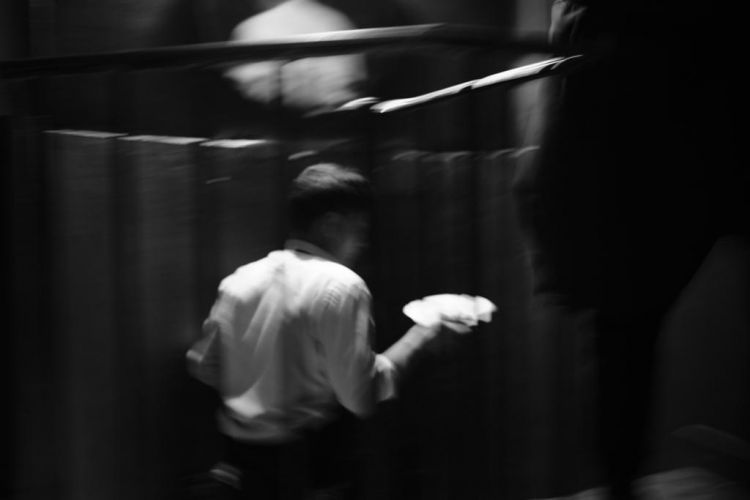
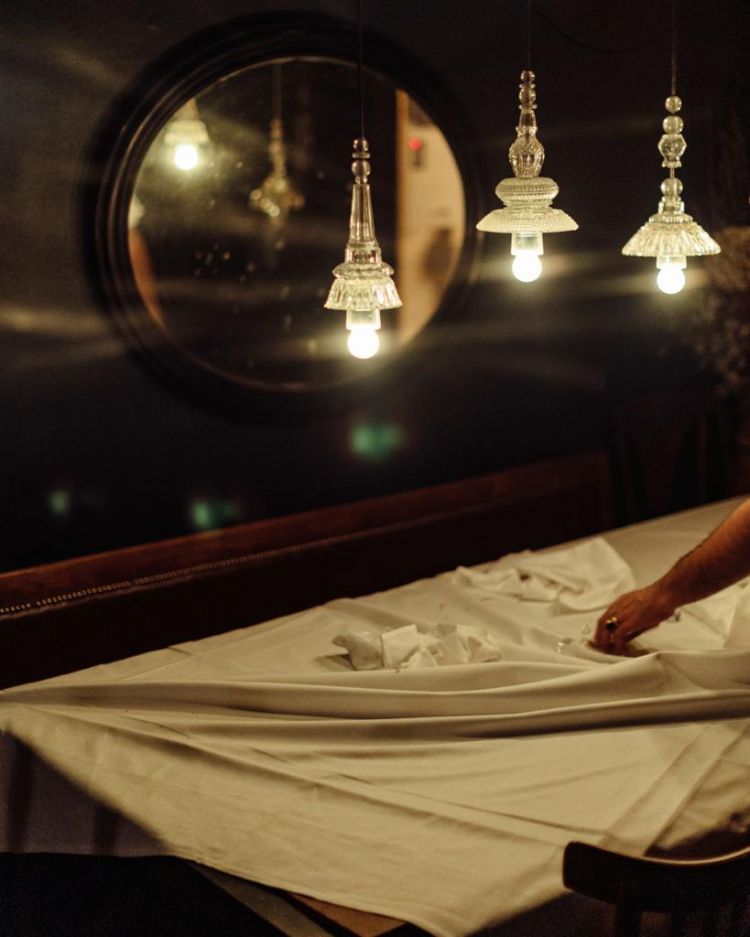
How can you make sure costs are low when salaries are above average? «You can get there gradually. At first, our accountant said that before we thought of making a profit, we had to cover a minimal total wage, a dignified percentage of food cost– which in our case is around 28-30% -, rent, all the utilities and unforeseen expenses too. We never paid for PR because we're a small craftmanship business and, almost always, those in that filed cannot find a way to be sufficiently in harmony with the client's identity. It helps that we are free: today we only respond to banks, not other partners. And we're willingly small: nonna Marisa always told me ‘best to have your own restaurant with 4 tables than one with 10 but other partners too’. I followed her advice».
It the company is healthy, profits will come: «Our profits are around 20% of total revenue». Not bad. But money is a mathematical consequence of an attitude that enhances the value of the people working with you: «I'd like to point out that all our cooks today used to be kitchen hands. I love training. Now I'm happy to spend more time teaching than cooking. Helping people grow is the most important thing». And it has a positive outcome on the clients' mood too.
ON RESTAURANTS AND SUSTAINABILITY, READ ALSO:
Antonia Klugmann: «I work to make my team irreplaceable»
Piero Pompili: «The restaurant of the future guarantees moral and economic dignity to its employees»
Enrico Bartolini: «The cook's profession should be safeguarded, or it will disappear»
Matias Perdomo: «The only creativity is that the financial part is in good health»
Luca Sacchi, Cracco's right arm: «Cuisine has grown a lot; but the same doesn't apply to the quality of the cooks' lives»
Loyalty, respect and two days of rest: Mauro Uliassi's recipe for happiness
Translated into English by Slawka G.Scarso